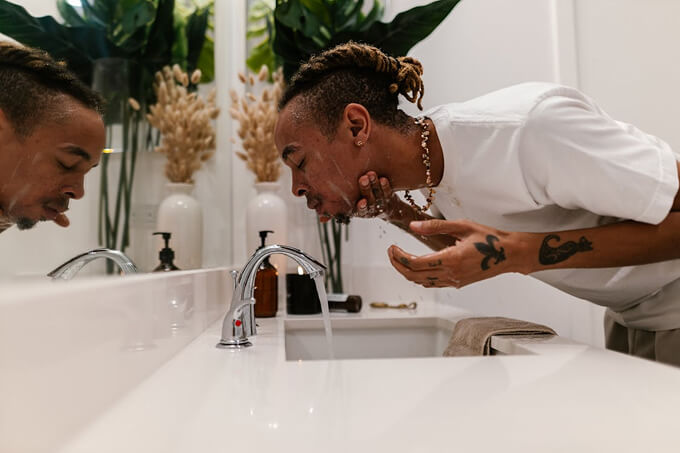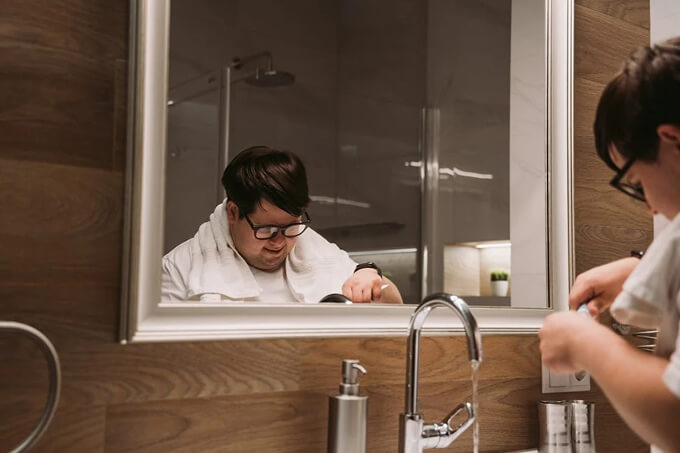How Does Hard Water Impact Hair Health?
- Written by Kobla Kugbega
- Feb 19, 2025
- |
- 8 min read
 Listen to the full text
Listen to the full textSpeaking of hair brushing, have you noticed some difficulty particularly with hair setups or toupees? Perhaps, after washing your hair, the strands seem impossibly rough and tangly. Or maybe your hands feel filthy after some cleansing. If so, you’re most likely dealing with hard water problems that many people have encountered.
As published by the International Journal of Trichology, there studies have expressed that hard water hair wash has shown a 62% decrease on hair tensile strength as opposed to distilled water. In simpler terms, hair washed with hard water breaks much more easily than water that is softened or distilled.
What Is Hard Water?

Hard water is an abundance of water that is mixed with minerals like iron, calcium, magnesium etc. These particles typically mix as water flows through rocks and soil. These minerals are safe to take in and drink, but hard water has an overconsumption of these particles that results in unique problems especially with human skin and hair.
Hard water is a crucial problem that needs an immediate solution. A survey conducted by the American Water Works Association, published in 2021, indicates more than 85% of American households are water supplied with hard water. Moreover, these issues have led to an increase in hair damage and scalp soreness. Understanding how hard water can damage skin and hair is the first step towards finding a solution.
Dry and Brittle Hair
If you have hard water, the minerals present in it begin to form a layer on your hair, restricting moisture from entering the strands. This leads to dry and brittle hair over a certain period of time. Along with this, calcium and magnesium build up act as a barricade which strip your hair of their natural oils and leave the hair dry.
Further worsening the problem, the dry and brittle hair can leave the structure of the hair fragile, resulting in split ends and breakage. In order to prevent this issue, regularly using a deep conditioning treatment may aid in restoring lost moisture and return softness to your hair.
Dull and Lifeless Appearance
Hard Water can often make your head dull. The minerals present in the hard water can coat the hair strands, preventing light from reflecting off the strands. This may make your hair appear dull and coarse when touched.
These days, if you notice your hair is getting more and more dull, clarifying shampoo can certainly be effective. These are specially designed to remove the mineral build up and other impurities, allowing your hair to glow naturally.
Difficult-to-Manage Hair
The use of hard water on natural hair or hair wigs can make them coarse and impossible to comb or brush. This is because the combs and brushes have a hard time moving through the hair as a result of the increased friction caused by the changes in texture resulting from the absent minerals.
You can try using some detangling spray or a leave-in conditioner to help with the tangles. These products can smooth out the hair cuticle and provide a protective layer against mineral deposits.
Scalp Dysregulation & Dandruff
Besides hard water damaging your hair, it can lead to an unhealthy bark. Since hard water has an excess of minerals, it gets such concentrated that skin on your head can start to itch and develop dry dandruff. The film produced by hard water can also stop pores from opening inducing irritation as well as acne on the scalp.
Hard water can contribute towards skin conditions like eczema and dry skin which can harm the scalp. Nonprofit organizations like the National Eczema Association bring this to light. A vinegar rinse can come to your cave and get rid of your scalp’s external pH while hydrating the skin beneath. Apple cider vinegar mixed with water does the trick.
Rapid Color Fading
Hard water is considered an extreme enemy if you dye your hair. Because of the minerals in hard water your hair strands can become void of color molecules much faster in hard water compared to soft water. This is most impactful for bold shades like red and blue, or light tones during summertime.
Color protective shampoos and conditioners can be used to minimize the damage. Having a water softener can stop mineral deposits from stripping the color out of your hair.
Greasy and Heavy Sensation
Instead, hard water can also make your hair feel coarse and oily. This is due to the fact that, contrary to expectations, hard water makes your hair feel dirty after you wash it due to the minerals making your hair feel heavy.
To alleviate the feeling of greasiness and weight while traveling, switch to bottled water for rinsing because it mixes well with hair products and is easier to wash out.
Mitigating Hard Water Effects
To reduce the effects of hard water on your hair, consider using the following solutions:
1. A good removing shampoo is highly recommended.
Unique shampoos are made to specifically remove build-up of certain minerals. Using it one time each week will allow the hair to feel anew, though overusing can lead to the hair being deprived of its essential oils.
2. Purchase a water softener.
This solution works the best for hardness pertaining to water. Water softeners pull excess minerals from the water supply leading to a better environment to the hair and skin.
3. Use a combination of water and vinegar
Vinegar combined with water aids in the removal of mineral deposits while aiding in returning the natural balance of the scalp. For this, mix one part of apple cider vinegar with two portions of water and use it as a rinse.
4. Use conditioner more.
Once a week deep conditioner treatment can aid in fixing dryness and brittleness, achieve the results by using products with hydrated argan oil, shea butter, or aloe vera.
5. Drink bottled water.
If an area with hard water is visited, drinking bottled water can aid in removing any built-up minerals after shampooing leading to fresh feeling hair.
6. Take Care of Your Hair as You Swim
Swimming pool water can be hard, promoting further mineral deposits. Use a swimming cap to protect hair from the effects of chlorine and hard water.
Importance of the Topic

If not appropriately managed, hard water can lead to other hair related issues such as excessive hair fall and breakage in the long run. Adopting the right hair routine can help aid in the prevention of hair loss.
Research has shown that things like the use of water filtration systems and other natural remedies can go a long way in dealing with hard water effects, which is why nonprofits like the Environmental Working Group focus on water quality and its overall effects to promote better health.
Conclusion
Hard water may be an unavoidable reality in some regions, but its negative effects on your hair health don’t have to be a lasting problem. By understanding the signs of hard water damage and taking proactive steps and using reliable hair accessories to protect your hair, you can maintain healthy, vibrant locks. Whether it’s investing in a water softener, using clarifying products, or adopting natural remedies like vinegar rinses, there are plenty of ways to safeguard your hair from the harsh effects of hard water.


